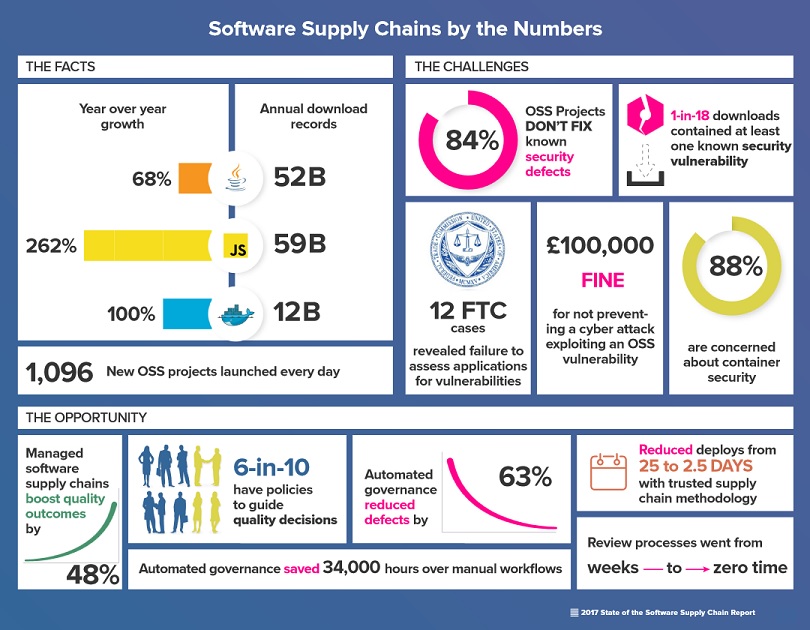Backslash Security introduced its Fix Simulation and AI-powered Attack Path Remediation capabilities.
Organizations that are actively managing the quality of open source components flowing into production applications are realizing a 28 percent improvement in developer productivity, a 30 percent reduction in overall development costs, and a 48 percent increase in application quality, according to the 2017 State of the Software Supply Chain Report from Sonatype.
Furthermore, analysis of more than 17,000 applications reveals that applications built by teams utilizing automated governance tools reduced the percentage of defective components by 63 percent.
Conversely, organizations failing to manage software supply chains are unwittingly releasing vulnerable applications into production, wasting thousands of hours on rework and bug fixes, and facing increased liability due to gross negligence.
Additional key findings of the 2017 State of the Software Supply Chain report include:
Consumption of open source components is growing on a massive scale
■ Year-over-year downloads of Java components grew 68 percent (52 billion in 2016), JavaScript downloads grew 262 percent (59 billion in 2016), and demand for Docker components is expected to grow 100 percent (12 billion downloads).
■ Faced with a near infinite supply of open source components, high-functioning DevOps organizations are utilizing machine automation to govern the quality of open source components flowing through their software supply chains.
Open source component suppliers remain slow to fix vulnerabilities
■ Even when vulnerabilities are known, OSS projects are slow to remediate - if they do so at all. Only 15.8 percent of OSS projects actively fix vulnerabilities, and even then the mean time to remediation was 233 days.
■ This puts the onus on DevOps organizations to actively govern which OSS projects they work with, and which components they ultimately consume.
Number of downloaded components with known vulnerabilities is slightly decreasing
■ In 2016, the percent of Java components downloaded from the Central Repository that contained known security vulnerabilities fell to 5.5 percent (1 in 18), down from 6.1 percent the year prior.
■ Although this defect download ratio is far from perfect, there is empirical evidence that hygiene is beginning to improve with ratios declining slightly in each of the last three years.
The regulatory landscape is rapidly changing
■ In the past year in the United States, the White House, four federal agencies, and the automotive industry have released new guidelines to improve the quality, safety, and security of software supply chains.

Wayne Jackson, CEO, Sonatype, said: “Companies are no longer building software applications from scratch, they are manufacturing them as fast as they can using an infinite supply of open source component parts. However, many still rely on manual and time consuming governance and security practices instead of embracing DevOps-native automation. Our research continues to show that development teams managing trusted software supply chains are dramatically improving quality and productivity.”
Methodology: The 2017 State of the Software Supply Chain Report blends a broad set of public and proprietary data with expert research and analysis. This year’s report extends beyond Java data to include supply chain findings from JavaScript, NuGet, Python, and Docker ecosystems.
Industry News
Check Point® Software Technologies Ltd. announced the appointment of Nadav Zafrir as Check Point Chief Executive Officer.
Sonatype announced that Sonatype SBOM Manager, its Enterprise-Class Software Bill of Materials (SBOM) solution, and its artifact repository manager, Nexus Repository, are now available in AWS Marketplace, a digital catalog with thousands of software listings from independent software vendors that make it easy to find, test, buy, and deploy software that runs on Amazon Web Services (AWS).
Broadcom unveiled the latest updates to VMware Cloud Foundation (VCF), the company’s flagship private cloud platform.
CAST launched CAST SBOM Manager, a new freemium product designed for product owners, release managers, and compliance specialists.
Zesty announced the launch of its Insights and Automation Platform.
Progress announced the availability of Progress® MarkLogic® FastTrack™, a UI toolkit for building data- and search-driven applications to visually explore complex connected data stored in Progress® MarkLogic® platform.
Snowflake will host the Llama 3.1 collection of multilingual open source large language models (LLMs) in Snowflake Cortex AI for enterprises to easily harness and build powerful AI applications at scale.
Secure Code Warrior announced the availability of SCW Trust Agent – a solution that assesses the specific security competencies of developers for every code commit.
GFT launched AI Impact, a new solution that leverages artificial intelligence to eliminate technical debt, increase developer efficiency and automate critical software development processes.
Code Metal announced a $13M seed, led by Shield Capital.
Atlassian Corporation has achieved Federal Risk and Authorization Management Program (FedRAMP) “In Process” status and is now listed on the FedRAMP marketplace.
Check Point® Software Technologies Ltd. announced that it has received a Leader ranking in The Forrester Wave™: Mobile Threat Defense Solutions, Q3 2024 report.
Mission Cloud announced the launch of Mission Cloud Engagements - DevOps, a platform designed to transform how businesses manage and execute their AWS DevOps projects.
Accelario announces the release of its free TDM solution, including database virtualization and data anonymization.




